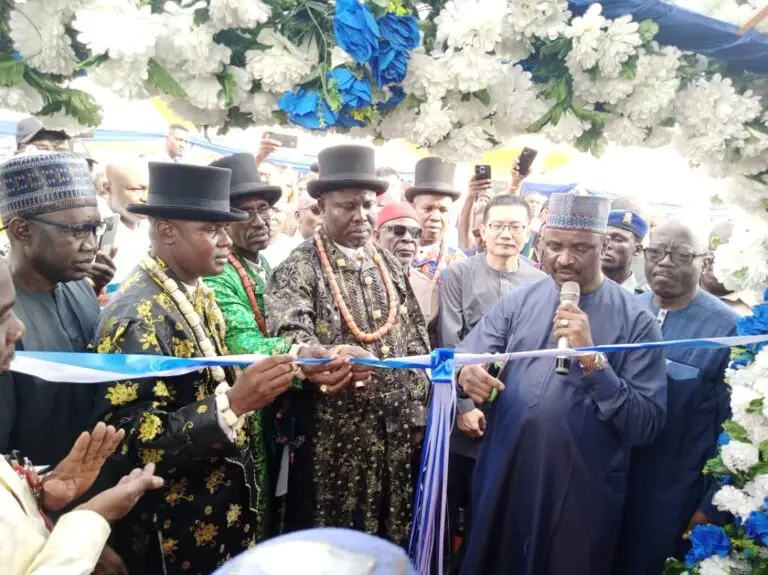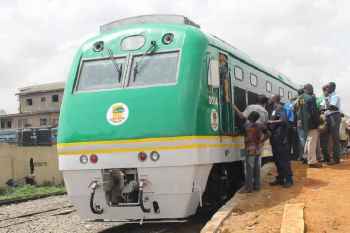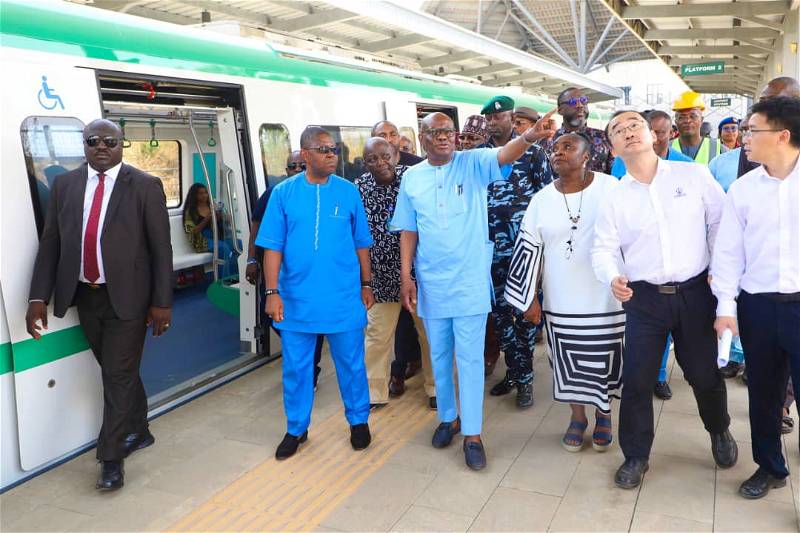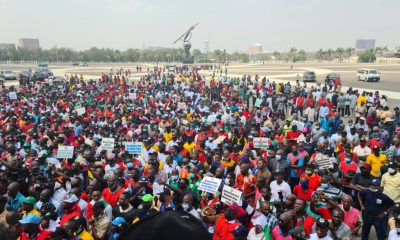Railway
2010: Year of the speed train

By Adeyinka Aderibigbe
The transportation sector operated for most part of the year below optimal capacity due to the COVID-19 pandemic. Despite the fear of resurgence and a second wave of the pandemic, the launch of Lot II, known as the Lagos-Ibadan Standard Gauge, came with bright prospects.
From its take-off in October 2017, the pace of work had been appreciative. Given that the Itakpe-Ajaokuta-Warri line, which was the nation’s first standard gauge, was delivered after 35 years, and the second, from Abuja to Kaduna, took 12 years, the best of cynics had written the Lagos-Ibadan standard gauge off, as another white Elephant project by the Buhari administration.
The take-off of commercial activity was to clear the fog that the standard gauge was not a phantom project. Minister of Transportation, Rotimi Amaechi had been at the vanguard of changing the nation’s transportation narrative. By December, the only feature remaining on the project was the delivery of the stations.
Meanwhile, criticism also seems to be changing. The issue is no longer whether the government can deliver on the project, the criticism has shifted to the fares, which many considered “too unfriendly to the masses’’.
Amaechi, earlier in the month, had announced a range of fare ranging from N3000, economy class, to N5,000, business class and N6,000, first class. However, when the service eventually took-off, the government slashed the economy class to N2500. Amaechi has foreclosed a further review of the fares.
Buttressing the minister’s position, the Nigerian Railway Corporation’s Managing Director Fidet Okhiria said the service was affordable to many. According to him, the service would continue to run.
He said more coaches would be deployed to the train tracks as passenger volume increases.
“Two luxury coaches would be put on the tracks, while the frequency will increase to two, as soon as the passenger traffic increases,” Okhiria said.
Okhiria said the frequency of trips would also affect the movement timetable, which runs one return leg from Ibadan to Lagos. The train leaves Ibadan 8am and departs Lagos back to Ibadan at 4pm.
He said 15 Diesel Multiple Unit (DMU) locomotives and 25 wagon locomotives had been ordered, while wagons and coaches of various categories had been ordered by the Federal Government to be deployed on the route once it begins commercial operations.
The rail is also seen as the game changer in the maritime sector. The government sees rail as the solution to the traffic gridlock at Apapa and by extension, Lagos. Government has already given a marching order to the APMT to work its operations round the contractor in bringing the tracks into the port area for seamless haulage operations.
An active train system in the ports would expand the port’s potential as the cash cow of the nation’s economy.
Not only has the subsector domesticated the Executive Order 5, which focuses on the ease of doing business at the ports, it is preparing all agencies of government in the sector to gear up and police the nation’s waterways and national assets in order to deliver more funds to the coffers.
Despite the huge funding gaps, there has also been so much going on, on the inland waterways. One of beautiful interventions was the provision of water ambulances to prevent deaths in the event of accidents on the waterways.
The National Inland Waterways Authority (NIWA) embarked on aggressive enlightenment to drive home safety tips and voluntary compliance with waterways regulations by all operators.
But perhaps, more significant was the readiness of NIWA to begin the operation of its strategic inland ports, such as the Baro River Port in Niger State, the flagship port in the North, which despite the huge investments, were rendered unusable by lack of motorable roads to connect the inland port.
NIWA also improved its partnership with other states with effectiveness as the regulator on the waterways.
State of roads
Nigeria has 108,000 km of surfaced roads as at 1990. It is home to the largest road network in West Africa and second largest, south of the Sahara.
Since independence, the country has been battling dilapidated and decaying road infrastructure. The Lagos-Ibadan Expressway, for instance remains jaded, with the contractor announcing a new date of 2022 as completion date for the repair works on this critical road.
The government approved about N134 billion in 2018 to accommodate more features on some sections of this critical road.
The repairs started in 2000. At the last count over 150 highways, 66 interstate roads and 45 bridges scattered across 34 states, are in various stages of completion.
Minister of Works and Housing Babatunde Fashola had caused a stir last year, when he said the 2020 allocation could not even pay outstanding debts owed contractors and canvassed tolling some critical roads.
Southeast and Southsouth remained zones with the worst road profile, according to statistics by the FMWH. The story has hardly changed as the year winds down.
Fashola believes the administration is doing so much with much less, underscoring the regime’s penchant for prudence in the public sector.
But Nigerians seem not to see yet the gains of such frugal spending on critical roads.
Enabling laws
Despite its efforts, the Eighth Assembly could not deliver on any of the six bills that could have strengthened the transportation industry.
The Ninth Assembly is yet to begin work on all the bills for the sector. One of such bills was the bill seeking to repeal the Federal Road Maintenance Agency (FERMA) for a Federal Roads Authority, which passed second reading at the Eighth Senate.
Other such bills still hanging are: the Nigerian Railway Corporation (Act 1955) Amendment Bill, the Nigeria Transportation Commission Bill, which seeks to establish a regulator for the transportation sector, the Nigerian Shippers Council Amendment Bill, and the Nigeria Ports Authority Amendment Bill.
– The Nation
Railway
Finally, Port Harcourt-Aba train service begins with four-day free ride

Finally, Port Harcourt-Aba train service begins with four-day free ride

A four-day free train ride from Port Harcourt in Rivers State to Aba, Abia State will begin today, May 1, signifying commencement of rail service along the 62-kilometre route.
This is coming a month after the train operation on the rehabilitated narrow gauge track was initially meant to start.
Minister of Transportation, Senator Saidu Alkali, inaugurated the rail service in Port Harcourt on Tuesday.
Alkali said the project was part of the rehabilitation of 1,443km Port Harcourt to Maiduguri narrow gauge rail line.
He said that the Port Harcourt to Aba section of the project was the initial part of the Eastern narrow-gauge railway, aiming to connect five geopolitical zones of the country.
He said, “The Federal Government is pleased to inaugurate the train service from Port Harcourt to Aba, a key priority area of President Bola Tinubu’s administration.
“We are grateful to God for the completion of the Port Harcourt to Aba section, which will bring succour to the people.
“The Eastern narrow gauge covers five geo-political zones of the country, including South-South, South-East, North-Central, North- West, and North-East,” he said.
Aba to Enugu rail is next
Alkali said following the completion of the first segment and the start of commercial operations of the rail service, the Federal Government would soon commence the construction of the Aba to Enugu rail project, linking the two states together.
He added that his ministry was working with investors to ensure the conversion of the locomotive across the country from diesel to Compressed Natural Gas (CNG) to reduce transportation costs further.
“Shortly, we will take a train ride from Port Harcourt to Aba, which means that from today, passenger train service has commenced.
“We will continue the project from Aba to Enugu and from Port Harcourt to both Onne and Port Harcourt seaports for freight services.
“The ministry is currently in discussion with an investor to convert our locomotive from diesel to Compressed Natural Gas (CNG) to reduce transportation costs further,” he said.
The minister assured Nigerians that arrangements were being made with security agencies to ensure adequate security along the rail routes.
He also announced free train rides from Port Harcourt to Aba between May 1 to May 4.
“The train will depart from Port Harcourt to Aba at 8am daily, while it will leave Aba to Port Harcourt at 3pm daily.
“Full commercial operations will resume on May 7, 2024,” he said.
Railway
Our medical team tried to rescue policeman who died on Abuja-Kaduna train – NRC

Our medical team tried to rescue policeman who died on Abuja-Kaduna train – NRC
The Nigerian Railway Corporation has reacted to the death of policemen while on escort duty aboard the Abuja-Kaduna train on April 5, saying the deceased received medical attention on the train.
It said this in a statement on Tuesday.
The police escort attached to the train was said to have died on the train conveying passengers from Kaduna to Abuja last Thursday.
The police officer reportedly complained of chest pain before he collapsed and died.
Some have accused the NRC of not having medical personnel on board.
But the NRC said there was a medical doctor on duty on the train when the incident happened.
It disclosed that the official was also assisted by a passenger, also a medical practitioner.
The statement read in part, “The NRC management wishes to emphatically inform the general public that we have well trained medical personnel and equipped medical cubicle to attend to any emergency health challenges of our esteemed passengers.
“For the avoidance of doubt, the medical personnel on duty was Mariam Abdulai who was assisted by a good Samaritan medical practitioner that happens to be our passenger on board to revive the ailing cop but was in futility.
“The management of the NRC expresses its heartfelt condolence to the bereaved family of the late police inspector, Nambut Selbol, who was escort on duty in Abuja – Kaduna train service on that fateful day.”
Railway
Abuja metro rail 97% ready, says Wike after 30-minute ride

Wike in 30-min ride on Abuja metro train, says it’s 97% ready
Minister of the Federal Capital Territory (FCT), Nyesom Wike, on Friday undertook a 30-minute ride on the Abuja metro train after an inspection of the intra-city rail project.
The train ride was done after an inspection tour from the Metro Station in Central Area to the Nnamdi Azikiwe International Airport, Abuja.
He disclosed that the Rail Mass Transit (ART) project was 97 per cent ready.
Wike President Bola Tinubu would be happy to commission the Abuja Rail Mass Transit project in May.
The minister described the development as a “dream comes true”.
He said the project would be ready for inauguration to celebrate Tinubu’s one year in office.
Wike said Tinubu had approved the schedule for the inauguration of projects in the FCT.
The minister said, “We are very happy. We are almost 97 per cent completed. All works are ongoing to make sure that the May delivery date is a reality.
“I believe this is one of the projects Mr President would like to inaugurate, because it is very key to the development of the economy.
“For me, it is a dream come true, and we are happy that after all said and done, the metro line will be put to use for Nigerians, come May 29″.
After the test ride from the Metro Station to the Airport, the minister declared that it would be more convenient to use the train than vehicles to go to the airport.
He added, “I am really impressed with the contractor, China Civil Engineering Construction Corporation (CCECC).
“The company has assured us that all the renovation works on the stations will be ready before the commissioning date.”
-

 metro2 days ago
metro2 days agoLabour Day: Nigerian workers are dedicated, resilient, says NURTW leader
-

 Auto2 days ago
Auto2 days agoAppeal court takes over NURTW case as NIC withdraws
-

 News2 days ago
News2 days agoLabour-FG face-off imminent as NLC rejects new salary increase
-

 News2 days ago
News2 days agoFG approves salary increase for civil servants, military, police
-

 metro23 hours ago
metro23 hours agoSecurity forces, vigilantes arrest kidnapper terrorising communities in Kogi
-

 International2 days ago
International2 days agoBinance founder bags jail term in US
-

 metro2 days ago
metro2 days agoTerrorists release video of kidnapped palace servant, others in Zamfara
-

 metro3 days ago
metro3 days agoWoman arrested in Ogun after husband commits suicide













You must be logged in to post a comment Login